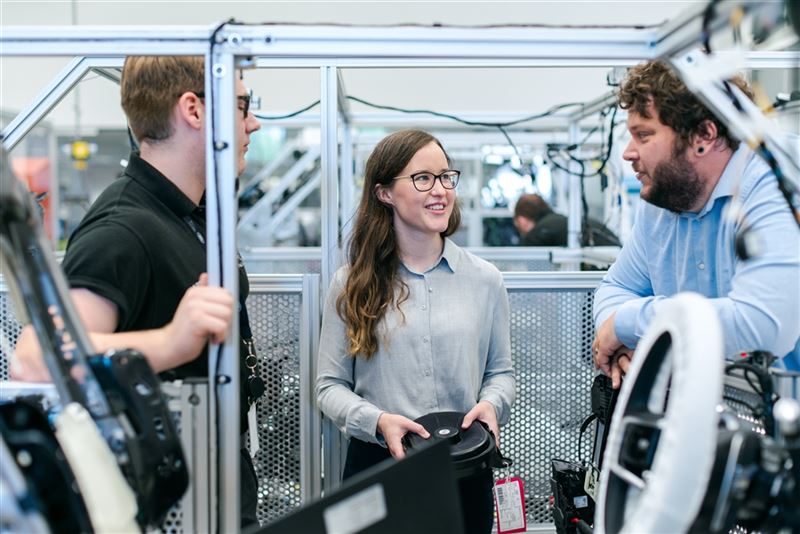Overview of Engineer, Humanities Specialist, International Services Visa in Japan
The Engineer, Humanities Specialist, International Services visa is typically obtained when working in Japan, and most occupations (accounting, sales, technology development, etc.) in which you work as a normal office worker with a desk job are eligible for this visa.
Specific examples of occupations that are eligible for this visa include the following:
- Occupations that are considered science-related jobs, such as SE and engineers (technology: science, engineering, and other natural science fields)
- Occupations that are considered to be in the humanities, such as accounting and sales (humanities knowledge: law, economics, sociology, and other humanities fields)
- Occupations such as interpretation and overseas transactions that utilize the cultural background of foreigners (international work: work that requires thinking or sensitivity based on foreign culture)
This page provides detailed information about the Engineer, Humanities Specialist, International Services Visa, from the basics such as the details of the eligible occupations, the conditions for obtaining it, and the documents required for the procedure, to the things to be careful about such as mid-career recruitment.
Please feel free to contact our office if you have any questions or concerns about the procedures for Engineer, Humanities Specialist, International Services Visa.
Key points for Engineer, Humanities Specialist, International Services Visa
If you are applying based on your academic background, you must have graduated from a vocational school, junior college, or university in Japan, or a junior college or university overseas.
If you are applying based on your Job career, you must have at least 10 years of experience in the type of job you plan to work in (3 years or more in the case of international work).
In addition to working as full-time employees, those who work on contracts such as contract or delegation are also eligible. You can also work as a temporary employee.
Industry refers to the business that a company operates in, such as manufacturing, service, and food and beverage. Basically, almost industries are eligible, but as explained below, it is necessary that the type of occupation is clearly divided into desk work and field work.
Field work refers to occupations such as construction site workers, restaurant kitchen staff, and factory line workers, these are not eligible for the Engineer, Humanities Specialist, International Services visa.
In other words, it is possible to work in a desk job such as accounting or design at a company in the construction industry, but it is not possible to work as a site worker in the same construction industry.
When applying for the first time, permission is often granted for one year, but if you continue to renew your qualifications without any problems, you can be granted permission for a longer period of time, such as three years.
Specific examples of target occupations
1. Examples of occupations in science, engineering, and other natural science fields

This is an occupation that falls under the Engineer category of the Engineer, Humanities Specialist, International Services visa.
Jobs that are generally referred to as science-related jobs include engineers, development work, design work, CAD and CAM engineers, system engineers, and network engineers.
2. Examples of occupations in the fields of law, economics, sociology, and other humanities

This is an occupation that falls under the category of humanities specialist in the Engineer, Humanities Specialist, International Services visa.
Typical jobs include the human resources department, legal department, sales, and accounting. Other jobs such as editors and financial planners also fall under humanities knowledge.
3. Work that requires thinking or sensitivity based on foreign culture

This is a job category that falls under International Services in the Engineer, Humanities Specialist, International Services Visa.
The types of jobs that can be applied for for International Business are limited to the following types.
- Translation
- Interpretation
- Language Instruction
- Public Relations
- Advertisement
- Overseas Trading Operations
- Design Related to Clothing and Interior Decoration
- Product Development
- Other similar work
The Permission conditions of the Engineer, Humanities Specialist, International Services Visa
The visa applicant must have a background that falls under one of the following 1, 2, or 3, and have acquired the skills or knowledge necessary for the content of the planned job.
1 Graduated from a university with a major in a subject related to the relevant technology or knowledge, or received an equivalent or higher level of education.
This condition is based on your academic background as a university graduate. This university includes graduates from junior colleges and graduate schools in Japan and overseas. If you have these educational backgrounds, the relationship between your planned job/occupation and the subject you majored in at university will be relatively loosely determined during visa screening.
2 The educational requirement is to have graduated from a vocational school in Japan. Graduation from a vocational school means that you have obtained the degree of ``Specialist''( SENMONSHI ) or ``Advanced Professional''( KOUDO SENMONSHI).
In addition, if you graduate from a school accredited by the Foreign Student Career Development Promotion Program in the specialized course of a vocational school (department of the accredited vocational course), you will be required to complete the planned job/occupation and major at the vocational school in the same way as a university graduate. The relevance of subjects is determined relatively loosely during visa screening.
If you are a graduate of any other vocational school, you will need to major in a subject that is specifically related to the skills and knowledge required for your planned job/occupation.
The educational requirement is to have graduated from a vocational school in Japan. Graduation from a vocational school means that you have obtained the degree of Specialist or Advanced Professional. If you are a graduate of a vocational school, you are required to major in a subject that is specifically related to the skills and knowledge required for your planned job/occupation.
3 Having 10 years or more of work experience. (including the period in which the person majored in a subject related to the relevant technology or knowledge in a university, technical college, high school, upper secondary education school course, or specialized training college course)
This is a condition when applying based on work experience such as work history rather than academic background. These 10 years can also include the period during which you majored in related skills or knowledge at schools in Japan or abroad.
The visa applicant must meet both 1 and 2 below.
- The content of the job you are applying for must fall under one of the following.
- Translation
- Interpretation
- Language Instruction
- Public Relations
- Advertisement
- Overseas Transaction Work
- Design related to Clothing and Interior Decoration
- Product Development
- Other similar work
- Have at least 3 years of work experience related to the planned job
However, if a university graduate engages in work that falls under the category of Translation, Interpretation, or Language instruction, the three-year work experience requirement will be waived.
Even if your job falls under international work, if you majored in a related field at university or a Japanese vocational school, you may be able to apply for an Engineer, Humanities Specialist, International Services visa under the condition of Humanities Specialist.
This is a condition common to all occupations in this visa field.
It is necessary to consider that the amount of remuneration is equal to or higher than that of Japanese people, not only in the company where you work, but also in the region where you work and in other companies who are engaged in the same type of work.
Procedures for applying : Engineer, Humanities Specialist, International Services Visa
The centerpiece of this process is receiving a Certificate of Eligibility (COE). This COE is required when applying for a visa at the Japanese Embassy.
- Applicant himself/herself (foreigner wishing to enter Japan)
- Employees of the company that will accept the applicant
- Application intermediaries, etc. who fall under any of the following (1) to (3) (persons who can submit application documents on behalf of those in 1 or 2 above)
*Limited to those in 1 or 2 above who are staying in Japan.
(1) An employee of a public interest corporation whose purpose is to facilitate the smooth acceptance of foreign national , and who is deemed appropriate by the Director-General of the Regional Immigration Bureau.
(2) Lawyer or administrative scrivener who has notified the Regional Immigration Bureau.
(3) Applicant himself/herself legal representative
| Procedure | Required time |
|---|---|
| 1. Preparation of documents | Approximately 1 month |
| 2. Screening for COE at the immigration office | Approximately 3 months |
| ( If approved in step 2, a COE will be issued. ) | |
| 3. Visa application with COE at the Japanese Embassy | Approximately 1 week |
| 4. Entering Japan | Within 3 months from the date the COE was issued |
The documents to be submitted will vary depending on which category the applicant workplace falls into in the table below.
| Category | Specific examples of applicable companies |
|---|---|
| Category 1 | Companies whose stocks are listed on the stock exchange, mutual companies operating insurance businesses, public agencies, etc. |
| Category 2 | Companies that paid more than 10 million yen in taxes on the salaries of all employees, etc. |
| Category 3 | Companies that have been operating for more than 2 years |
| Category 4 | Companies that do not fall under categories 1 to 3 (such as companies that have just been established) |
1. Certificate of Eligibility Application Form
2. Photo (4cm high x 3cm wide) 1 copy
Photos can be accepted even if they are pasted digitally into the photo section of the application form and printed directly. However, please make sure to use photos that meet the specified standards.
3. Reply envelope
4. Document certifying the degree of a specialist or advanced specialist
(submitted only when applying as a vocational school graduate)
5. Documents clarifying the details of the applicants activities at the place of dispatch
(submitted only if working as a temporary employee)
Category 1
Submit one of the following documents
・Copy of Shikiho or a copy of document certifying that it is listed on a Japanese stock exchange
・Document (copy) certifying that permission for establishment has been received from the competent government agency
Category 2
Submit one of the following documents
・Copy of legal record total table such as withholding tax slip for the previous years employment income
・Document certifying that the company has received approval for the application for use of the online residence application system
1. Documents clarifying the applicants job content, etc.
Documents differ depending on the applicants working position.
(If the company and the applicant conclude a labor contract)
・Copy of employment contract, notice of working conditions, etc.
(If the applicant becomes an officer of the company)
・Copy of the articles of incorporation that determine executive compensation or a copy of the minutes of the general meeting of shareholders that resolved executive compensation
(When transferring to a Japanese branch of a foreign company or becoming an officer of an organization other than the company)
・Documents from your organization that clarify your position in the company (including the work you are responsible for), your term of office, and the amount of remuneration to be paid
2 The following documents proving the applicants educational background or work history, etc.
・Resume that clearly indicates the organization, content, and period of work that required skills or knowledge related to the content of the application.
・One of the following documents from 1 to 4 that proves your academic background or work history, etc.
1. A graduation certificate from a university, etc., or a document certifying that you have received an equivalent or higher level of education.
2. A document proving the period of engagement in the related work, such as a certificate of employment.
3. In the case of IT engineers, a certificate of passing or qualification for an exam or qualification related to information processing technology.
4. If applying for International Services work, documents proving 3 years or more of work experience in the related work.
(Excluding cases where university graduates are engaged in translation/interpretation or language instruction.)
3. Copy of corporate registration
4. One of the following materials that clarify the business content
・Guide book or documents containing detailed information on the companys history, officers, organization, business content, etc.
・Documents similar to the above prepared by other workplaces, etc.
5. Documents to be added only for Category 3 companies (both documents below)
・Copy of legal record total table such as withholding tax slip for the previous years employment income
・Copy of the companys most recent years financial statements
6. For Category 4, add both materials from A and B below.
A. Copy of the companys financial statements for the most recent year
B. Any of the following materials
(In the case of a company etc. that is exempt from withholding tax)
・Certificate of exemption from foreign corporations withholding tax or other documents that clarify that withholding tax is not required
(For companies other than the above (both 1 and 2 below))
1. Copy of notification of establishment of payroll office, etc.
2. One of the following materials
・Income tax collection statement for employment income, retirement income, etc. for the most recent three months
・If you have received special exceptions for delivery dates, documents that prove that you have received such approval
At Hamaoka Administrative Scrivener Office, we provide comprehensive support including application to the Immigration Services Agency so that visas can be granted smoothly. If you have any concerns regarding visa/residence status procedures, please feel free to contact us.




